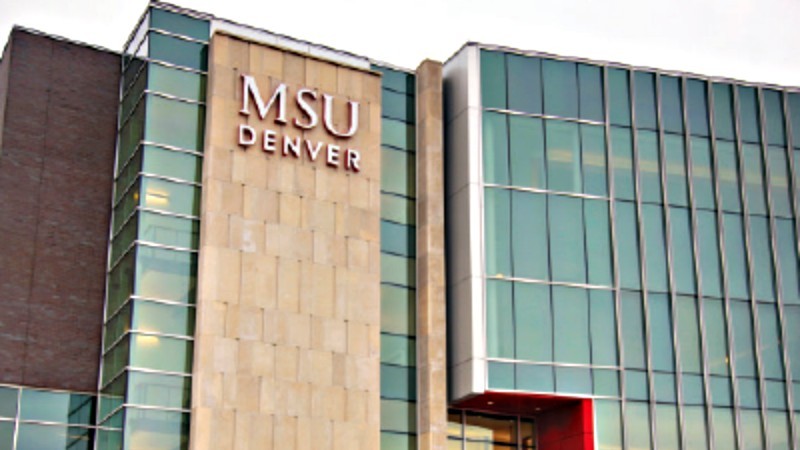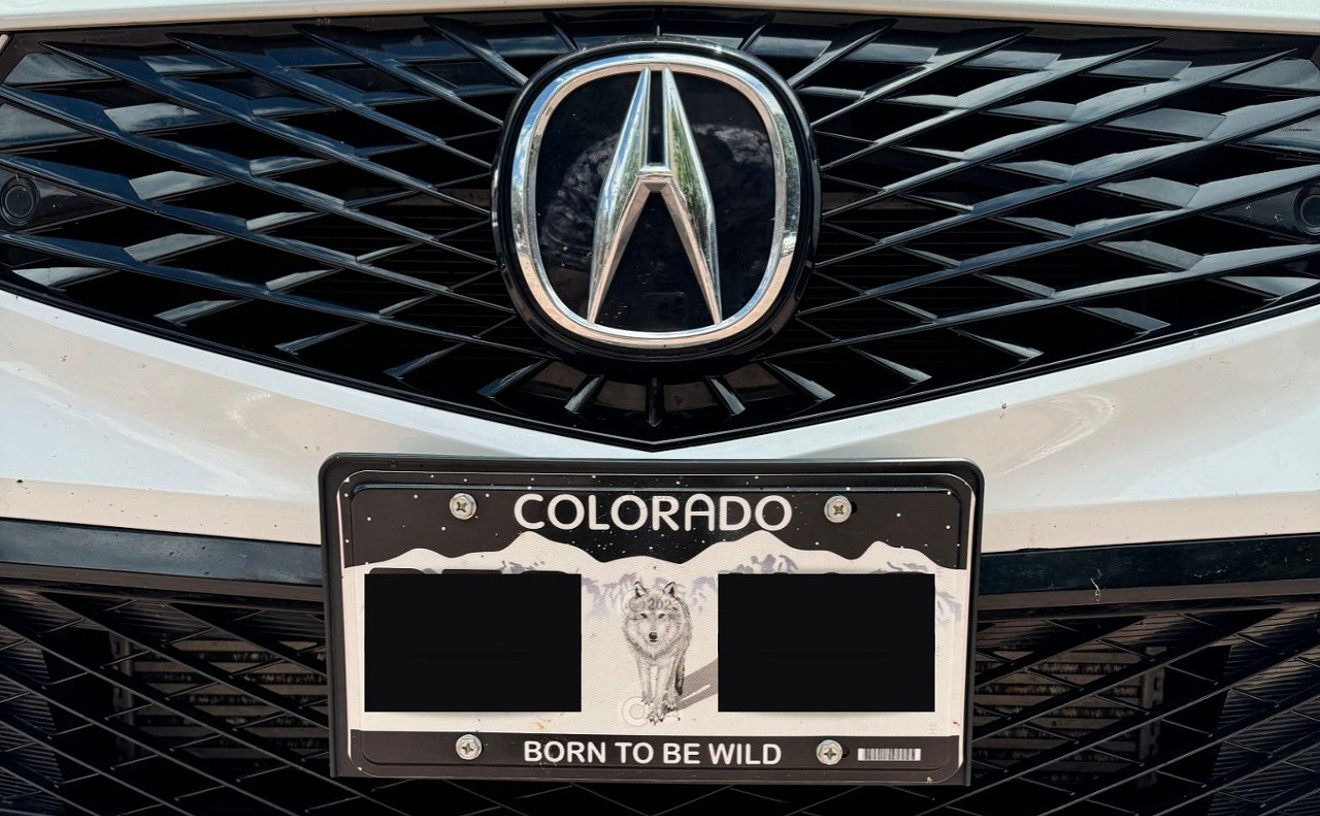Celeste Terry, an Oglala Lakota woman studying applied Indigenous law and science at Metropolitan State University of Denver, was in a car crash right before finals last spring, leaving her with medical bills on top of her tuition. So when MSU Denver President Janine Davidson announced at a May 6 commencement ceremony held for Native and Indigenous students that students from any of the 574 federally recognized tribes would no longer have to pay tuition and fees to attend the university because of a new grant program, it seemed like a solution to her problem.
She paid down her medical debt, assuming that she would soon receive a refund of her various educational grants through the federal government.
But the university says the MSU plan was never intended to function that way. Rather, it's a last-dollar program to cover tuition and fees for Native and Indigenous students who would otherwise have to pay. According to Terry, though, students only received that clarification right before school started, when many of them were still expecting extra funds to help cover living expenses. Terry, who has a background in coding, examined the metadata of the MSU Indigenous and Native Peoples’ Grant page and found that it wasn’t created until August 23, 2022, months after the very public announcement — though the university did add information about the program to its scholarship page in May.
“The university, I'm sure, is going to play this off like a big misunderstanding,” Terry says. “But I think what they don't realize is that it's super-harmful to make false promises to Native communities, especially in institutionalized settings.”
“While our official written announcement clearly explained this commitment was made possible by a combination of federal, state and institutional grants, the in-person announcement at our Native and Indigenous Graduation Celebration did not outline the specific details about the funding mechanisms,” MSU says in a statement regarding the confusion. “Students who only listened to the headline announcement presumed they would receive additional funds back.”
Julie Winans, who's enrolled with the Pawnee Nation as well as having Otoe Missouria and Wyandotte heritage, says that students repeatedly requested information about how the program would work over the summer, but never received a clear answer until they didn’t get the refunds they expected.
“I heard it just like everyone else heard it: ‘Hey, they came in and said they're gonna pay all our tuition and fees,’” she recalls. “I was like, for real, that's awesome. But also, immediately, we'll see. Just from the experience that I've had with MSU Denver since I've been there in 2017 as an Indigenous student. I didn't openly believe it, but I hoped. I did hope.”
When she started her coursework, Winans realized that the school didn’t have Indigenous student organizations or much institutional support for them, leading her to co-found MSU’s Native Indigenous Student Alliance, or NISA.
Winans is currently wrapping up a dual degree in Health Care Information Systems and has had other grants before. They all worked the same way, she says: The grants were applied to her student account shortly before classes started and paid off the balance. If there was any grant money left over, she would get a check in the mail or through direct deposit.
“When they made this announcement, calling it a 'grant,' it's not at all unreasonable for anyone to have assumed it was going to work like a normal grant, because that's what was implied in their wordage,” Winans says.
She didn’t realize the new program required an application, thinking the university would simply apply the tuition and fee removal to any student on the roll of a recognized nation. By the time she realized there was an application, she’d already heard from other students who said that the program was not working as they'd expected. She eventually decided to apply, but was denied.
Other colleges that have a similar program don't refer to it as a "grant." Colorado's Fort Lewis College describes it as a tuition waiver, and the University of California calls its program the Native American Opportunity Plan.
In its statement to Westword, the university does not use the word "grant":
“Our program pays tuition and mandatory fees for eligible students whose costs are not covered by other federal or state grants, which is a common and accepted practice in higher education,” MSU says. “Students who already receive financial aid covering all of their tuition and fees receive no additional funding, allowing us to ensure long-term sustainability and to expand eligibility to Coloradans with ties to Native nations all over the country, not just those historically based in the state.”
When the students realized that MSU's program would not work like the grants they were accustomed to, they asked to meet with university leadership.
But when they met with representatives from the president’s office on August 24, it didn’t go well. According to Terry, the university came up with its own agenda and turned the meeting into a question-and-answer session before finally allowing the students, including Terry and Winans, to present their prepared materials. “It was hard,” Terry says. “It was a difficult meeting for me, personally.”
Winans says she felt attacked, especially after the school admitted it had rushed the process of establishing the program. No solutions came out of the meeting, she adds.
“University leaders met with the affected students to better explain the program, hear their concerns, and to connect them with additional student resources,” the university says of the meeting. “MSU Denver grant administrators have since contacted each recipient individually to answer any remaining questions. We recognize the history of injustice in Indigenous or Native communities, and that is part of why we created this program.”
Students who were still concerned met with the president on August 29. Although she was grateful that Davidson took the time to meet with them, Winans says she felt that the university again claimed to have good intentions as a way to avoid admitting complicity in the harm the announcement did.
“That doesn't seem like you're remotely aware of how wrong it was for you to come into our ceremony unannounced, with…news cameras, and tokenize us with this empty promise,” Winans explains.
Davidson is looking forward to continuing to work with student leaders to reach shared goals of a diverse, respectful and inclusive university community, according to the university. The students say they have clear goals for that work: Along with honoring the promise of free tuition and fees, they want the university to issue a public apology and set up a steering committee, including Indigenous community members, to guide the future of the tuition program. That committee should have been established before the program was announced so that any confusion was avoided, they say.
“We've been very adamant throughout this whole process that we would like an apology as public as their announcement,” Winans says. “They're still out there trying to paint this shameful program as something great that they've done for Indigenous people. ... I acknowledge that you did help some people, but when you hurt more people than you helped, that is not a successful program.”
According to MSU, as of early September, 64 students had been awarded funding totaling $393,648 to apply toward tuition and mandatory fees.
Winans says she would rather not fight publicly with the university, where she's had some good times. But she's also committed to making it a better place, she adds, and she wants to be sure other Indigenous students have a more positive experience.
“I do not ever, ever want anyone, any future Indigenous student, walking onto an MSU Denver campus feeling like I have felt as an Indigenous student at MSU Denver,” she says. “I have felt unsupported. I have felt ostracized. I have felt tokenized. I have felt expendable. And I do not want the future Indigenous students of MSU Denver to feel like that because of tone-deaf policy that people are laying out without appropriate cultural consideration.”
“It's not about me,” Terry agrees. “It's about the seventy students who applied for this grant [and] thought that we were going to actually have support from the university, only to have them turn around and just be like, ‘Oh, just kidding, you misunderstood....' I don't want to think that this school I go to — my dad's alma mater — is an institution that really just doesn't care about Native students.”
This story was updated to include the amount awarded students by last week.
[
{
"name": "Air - MediumRectangle - Inline Content - Mobile Display Size",
"component": "12017618",
"insertPoint": "2",
"requiredCountToDisplay": "2",
"watchElement": ".fdn-content-body",
"astAdList": [
{
"adType": "rectangle",
"displayTargets": "mobile"
}
]
},{
"name": "Editor Picks",
"component": "17242653",
"insertPoint": "4",
"requiredCountToDisplay": "1",
"watchElement": ".fdn-content-body",
"astAdList": [
{
"adType": "rectangle",
"displayTargets": "desktop|tablet"
},{
"adType": "rectangle",
"displayTargets": "desktop|tablet|mobile"
}
]
},{
"name": "Inline Links",
"component": "18838239",
"insertPoint": "8th",
"startingPoint": 8,
"requiredCountToDisplay": "7",
"maxInsertions": 25
},{
"name": "Air - MediumRectangle - Combo - Inline Content",
"component": "17261320",
"insertPoint": "8th",
"startingPoint": 8,
"requiredCountToDisplay": "7",
"maxInsertions": 25,
"watchElement": ".fdn-content-body",
"astAdList": [
{
"adType": "rectangle",
"displayTargets": "desktop|tablet"
},{
"adType": "rectangle",
"displayTargets": "desktop|tablet|mobile"
}
]
},{
"name": "Inline Links",
"component": "18838239",
"insertPoint": "8th",
"startingPoint": 12,
"requiredCountToDisplay": "11",
"maxInsertions": 25
},{
"name": "Air - Leaderboard Tower - Combo - Inline Content",
"component": "17261321",
"insertPoint": "8th",
"startingPoint": 12,
"requiredCountToDisplay": "11",
"maxInsertions": 25,
"watchElement": ".fdn-content-body",
"astAdList": [
{
"adType": "leaderboardInlineContent",
"displayTargets": "desktop|tablet"
},{
"adType": "tower",
"displayTargets": "mobile"
}
]
}
]











